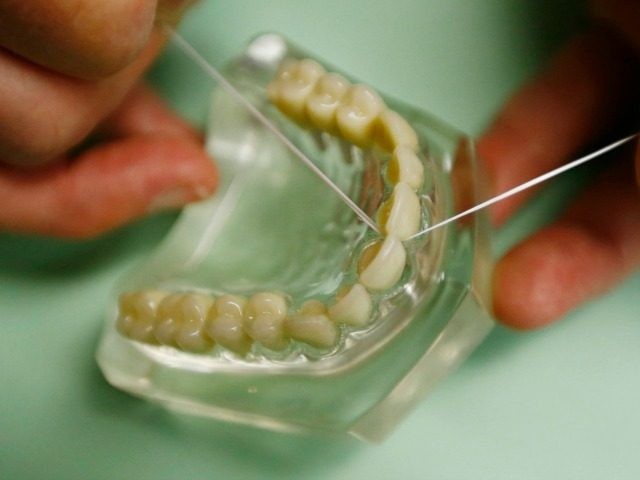A fascinating story from the Associated Press reveals that one of the most “settled” bits of science in the medical world was never based on anything better than a junk-science study: the benefits of dental floss.
It somehow took almost forty years for the dental community to realize, as the AP puts it, “there’s little proof that flossing works.” This despite a bona fide legal requirement from the almighty federal government that claims in the official Dietary Guidelines for Americans must be based on sound scientific evidence.
The government decided to quietly remove the recommendation for flossing this year, without formally notifying anyone. After the omission was noticed, Mama Government sheepishly admitted that the “effectiveness of flossing had never been researched, as required.”
The Associated Press decided to do what our $4 trillion super-government couldn’t be bothered to do, and took a look at “the most rigorous research conducted over the past decade, focusing on 25 studies that generally compared the use of a toothbrush with the combination of toothbrushes and floss.”
Only “weak,” “unreliable,” and “very low quality” evidence for the effectiveness of flossing at plaque removal could be found. Some evidence that it helps with gum inflammation was found, but even that was described as “very unreliable,” with the benefits essentially imperceptible to most dental floss users.
It turns out that the studies long cited to prove the benefits of flossing were ridiculously shabby, with outdated methods, ridiculously small sample sizes, and study periods so brief that it was virtually impossible for benefits or drawbacks from flossing to develop. The AP notes that one study “tested 25 people after only a single use of floss.” One of the studies the American Dental Association offered as proof that flossing helps to prevent gum disease lasted only two weeks, and didn’t even study gum disease.
The Associated Press even found Big Floss unable to defend its $2 billion market, as the industry “struggled to provide convincing evidence of their claims that floss reduces plaque or gingivitis,” even though it has “paid for most studies, and sometimes designed and conducted the research.”
That’s a wee bit problematic, since the American Dental Association is supposed to evaluate products that receive its Seal of Acceptance. In almost any other context, there would be a measure of outrage at the notion of an industry testing itself, especially if the tests didn’t follow the most rigorous methodology… and if the product not only failed to live up to its advertising, but actually proved harmful in some cases.
There are some genuine criticisms of dental floss in the Associated Press article, from fears that flossing might distract people from more effective hygiene practices, to the possibility that flossing can “damage gums, teeth, and dental work,” or even “dislodge bad bacteria that invade the bloodstream and cause dangerous infections, especially in people with weak immunity.”
Nevertheless, National Institutes of Health dentist Tim Iafolla said flossing was “low risk, low cost,” so people should keep doing it, “because we know there’s a possibility that it works.”
We know there’s a possibility it works makes a fine epitaph for the latest bit of “settled science” to bite the dust.
To expand on that thought, it doesn’t seem appropriate to dismiss flossing as a total waste of time and money, or a fully counterproductive practice. A fair case can be made for recommending a practice that helps sometimes, and is rarely harmful. On a case-by-case basis, dentists can no doubt point to many patients who receive concrete benefits from using dental floss.
The point is that the level of certainty, and certification, bestowed upon flossing has been wildly out of sync with the quality of the actual scientific research. Regulatory agencies that should have known better fell asleep at the switch for decades on end, trusting interested parties to provide their own research. The public was given an inaccurate impression of confidence and thorough study. A false “consensus” was manufactured for something that was actually a matter of dispute between experts.
Does all of that sound familiar?

COMMENTS
Please let us know if you're having issues with commenting.